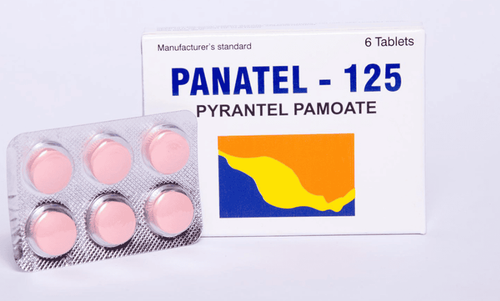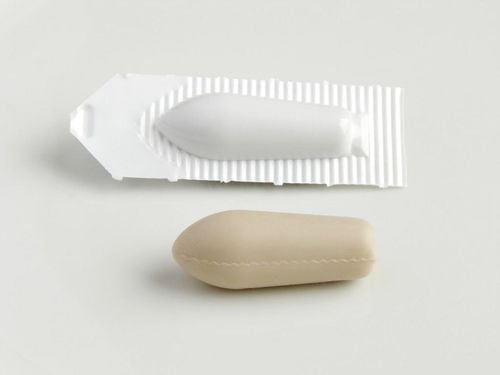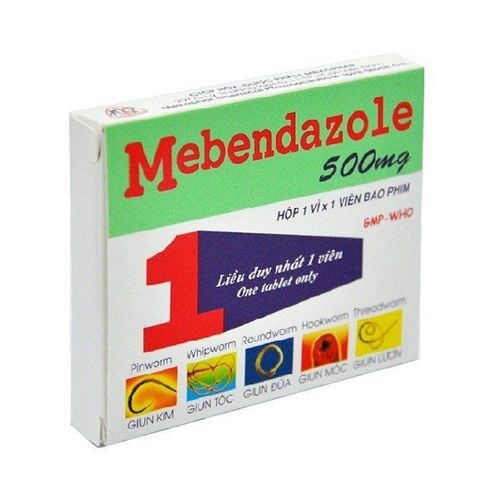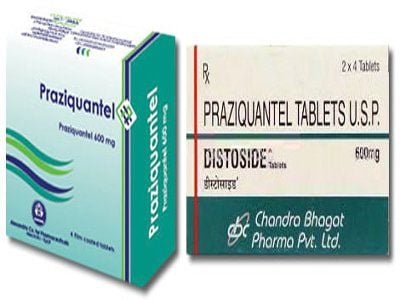1. What is Benda 500?
Benda 500 is a product of Thai Nakorn Patana Vietnam Co., Ltd., formulated in tablet form with the following composition:
- The main active ingredient is Mebendazole 500mg;
- Other excipients in sufficient quantities per tablet.
2. What are the uses of Benda 500?
The active ingredient Mebendazole in Benda 500 has a relatively broad-spectrum anthelmintic effect. It acts on both the larval and adult stages of many worms commonly infecting humans, such as roundworms, hookworms, whipworms, and pinworms. Notably, Benda 500 can also destroy the eggs of whipworms and roundworms.
When used at high doses, Benda 500 can also be effective against Giardia lamblia and certain developmental stages of tapeworms (cysticercosis).
The mechanism of Mebendazole in Benda 500 involves degrading microtubule structures in the cytoplasm of parasites, inhibiting glucose absorption in the adult stages of intestinal worms and their larvae in tissues. This results in reduced glycogen accumulation and decreased ATP production necessary for the survival and growth of the parasites, ultimately leading to their death. Importantly, Mebendazole metabolism does not affect blood glucose levels in humans.
Benda 500 demonstrates a high treatment efficacy of 90–100% in cases of roundworms, whipworms, and pinworms, though its effectiveness against hookworm infections is lower, at about 70%.
3. Indications and contraindications of Benda 500
Indications: Benda 500 is indicated for the treatment of infections caused by one or more types of intestinal worms, including: Roundworms (Ascaris lumbricoides), targeting eggs, larvae, and adult worms; Capillaria (Capillaria philippinensis); Hookworms (Ancylostoma duodenale or Necator americanus); Whipworms (Trichuris trichiura); Pinworms (Enterobius vermicularis), targeting eggs, larvae, and adult worms.
Contraindications:
- Hypersensitivity or allergy to Mebendazole or any component of Benda 500;
- Children under 2 years old;
- Pregnant women (especially during the first trimester) or breastfeeding mothers;
- Patients with a history of liver disease should not use Benda 500.
4. How to use Benda 500
4.1 Dosage
The dosage of Mebendazole varies depending on the type of worm infection. Note that the dosage is the same for children over 2 years old and adults.
- Pinworm infection: A single dose of 100mg Mebendazole. Repeat the same dose after two weeks as pinworm infections are prone to recurrence.
- Roundworms, whipworms, hookworms, or mixed infections: 100mg twice daily for three consecutive days, or a single dose of one Benda 500 tablet.
- Threadworm infection: 200mg twice daily for three days.
- Capillaria infection: 200mg twice daily for 21 days.
- Cysticercosis: 40mg/kg body weight once daily for 1–6 months.
4.2 How to use Benda 500 effectively
- Take Benda 500 orally with fatty foods to enhance absorption and bioavailability of Mebendazole.
- Patients can chew the Benda 500 tablet directly, swallow it with plenty of water, or crush and mix it with food (for children).
- Deworming should be repeated at regular intervals (typically 4–6 months).
- Albendazole is generally better tolerated than Mebendazole, so Benda 500 should only be used when Albendazole is unavailable.
5. Side effects of Benda 500
Patients using Benda 500 may experience some side effects, though they are generally rare:
- Gastrointestinal disturbances: diarrhea, abdominal pain, nausea, vomiting. Rarely, worms may exit through the nose or mouth.
- Dizziness, lightheadedness;
- Hives, rash, and angioedema;
- Seizures.
6. Precautions when using Benda 500
- Patients with a history of or current liver damage need dose adjustments for Benda 500.
- High-dose or long-term use of Mebendazole requires regular monitoring of platelet, white blood cell counts, and serum transaminase levels.
- Patients should maintain proper hygiene to prevent reinfection or spreading the infection.
- If a dose is missed, take it as soon as remembered unless it is close to the next dose. In such cases, skip the missed dose and continue the regular schedule. Never double the dose to avoid overdose.
- The use of Benda 500 in children under 2 years old has not been sufficiently studied and should be avoided unless absolutely necessary, weighing the benefits and risks.
- Pregnant and breastfeeding women, especially those in the first trimester, are not advised to use Benda 500.
7. Drug interactions of Benda 500
- With Cimetidine: Inhibits the enzyme Cytochrome P450, increasing plasma Mebendazole levels.
- With Carbamazepine or Phenytoin: Induces Cytochrome P450 metabolism, reducing plasma Mebendazole levels.
To arrange an appointment, please call HOTLINE or make your reservation directly HERE. You may also download the MyVinmec app to schedule appointments faster and manage your reservations more conveniently.













